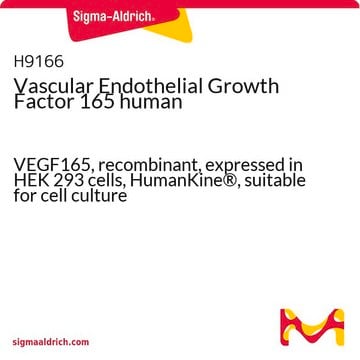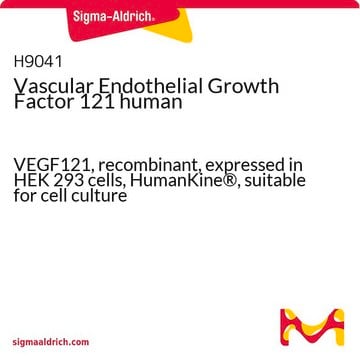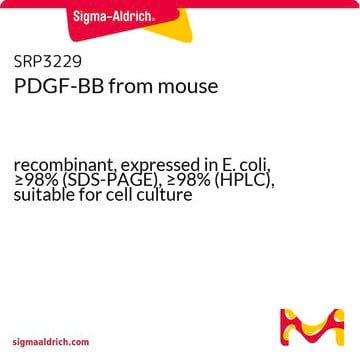V4512
Vascular Endothelial Growth Factor from mouse
VEGF, recombinant, expressed in E. coli, powder, suitable for cell culture
Synonym(s):
mVEGF, VEGF
Sign Into View Organizational & Contract Pricing
All Photos(1)
About This Item
Recommended Products
biological source
mouse
Quality Level
recombinant
expressed in E. coli
Assay
≥98% (SDS-PAGE)
form
powder
potency
≤10 ng/mL
quality
endotoxin tested
mol wt
protein 39 kDa
packaging
pkg of 10 μg
pkg of 50 μg
storage condition
avoid repeated freeze/thaw cycles
technique(s)
cell culture | mammalian: suitable
impurities
<1 EU/μg
UniProt accession no.
storage temp.
−20°C
Gene Information
mouse ... VEGFA(22339)
General description
Vascular endothelial growth factor is also known as VPF, VEGF and MVCD1. It is secreted from endothelial cells and pericytes in response to hypoxia. It helps in inducing angiogenesis and microvascular hyperpermeability. VEGF levels are associated with vasculitic neuropathy and may be used to predict this disease. It may also act as a marker in the development and progression of early precancerous lesions of oesophagus.
Application
Vascular endothelial growth factor (VEGF) supports development of new blood vessels during embryonic development and after vascular injury.Vascular endothelial growth factor from mouse was used for ELISA and in matrigel plugs (matrigel was supplemented with VEGF).
Other Notes
Homodimeric protein consisting of two 165 amino acid polypeptide chains of mouse VEGF.
Physical form
Lyophilized from a 0.2 μm filtered buffered solution.
Analysis Note
The biological activity is measured by the ability to stimulate 3H-thymidine incorporation in human umbilical vein endothelial cells (HUVEC) and bovine aortic endothelial cells.
Storage Class Code
11 - Combustible Solids
WGK
WGK 3
Flash Point(F)
Not applicable
Flash Point(C)
Not applicable
Personal Protective Equipment
dust mask type N95 (US), Eyeshields, Gloves
Certificates of Analysis (COA)
Search for Certificates of Analysis (COA) by entering the products Lot/Batch Number. Lot and Batch Numbers can be found on a product’s label following the words ‘Lot’ or ‘Batch’.
Already Own This Product?
Find documentation for the products that you have recently purchased in the Document Library.
Customers Also Viewed
Katsuhisa Tashiro et al.
Stem cells and development, 23(18), 2202-2210 (2013-12-19)
Vascular endothelial growth factor (VEGF) is reported to exhibit potent hematopoietic stem/progenitor cell (HSPC) mobilization activity. However, the detailed mechanisms of HSPC mobilization by VEGF have not been examined. In this study, we investigated the effect of VEGF on bone
Asieh Golozar et al.
European journal of cancer (Oxford, England : 1990), 50(16), 2855-2865 (2014-08-31)
Mechanisms involved in wound healing play some role in carcinogenesis in multiple organs, likely by creating a chronic inflammatory milieu. This study sought to assess the role of genetic markers in selected inflammation-related genes involved in wound healing (interleukin (IL)-1a
Victor Manolov et al.
Clinical laboratory, 60(9), 1573-1577 (2014-10-09)
Vascular endothelial growth factor (VEGF) is secreted from endothelial cells and pericytes in response to hypoxia. It induces angiogenesis and microvascular hyperpermeability. We observe serum VEGF concentrations in some patients with vasculitic neuropathy. Plasma VEGF was measured using GenWay's human
Jafar Rezaie et al.
Journal of cellular biochemistry, 119(1), 524-535 (2017-06-14)
This experiment investigated the impact of serum from patients with type 2 diabetes mellitus on the angiogenic behavior of human mesenchymal stem cells in vitro. Changes in the level of Ang-1, Ang-2, cell migration, and trans-differentiation into pericytes and endothelial
Farzana Sharmin et al.
Journal of orthopaedic research : official publication of the Orthopaedic Research Society, 35(5), 1086-1095 (2016-05-08)
Autografts have been shown to stimulate osteogenesis, osteoclastogenesis, and angiogenesis, and subsequent rapid graft incorporation. Large structural allografts, however, suffer from limited new bone formation and remodeling, both of which are directly associated with clinical failure due to non-unions, late
Our team of scientists has experience in all areas of research including Life Science, Material Science, Chemical Synthesis, Chromatography, Analytical and many others.
Contact Technical Service









